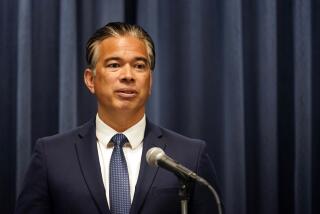Lawyer for Newport Interstate Says Company Did No Wrong
- Share via
An attorney for Newport Interstate Properties Inc.--accused this week in an involuntary bankruptcy petition of misappropriating $897,000 from investors--said Friday that neither the company nor its president had done anything wrong.
The attorney, Gary S. Mobley, also represents Newport Interstate’s president, Richard J. Lorenat. Mobley said he was surprised by former investors’ petitions for the involuntary liquidation of the assets of both the company and of Lorenat. “We vigorously deny any wrongdoing and intend to oppose these petitions,” Mobley said.
In petitions filed Thursday in U.S. Bankruptcy Court, 11 investors alleged that Newport Interstate violated federal securities law by lying to them and misappropriating their assets.
The investors said they each put up $75,000 to $250,000 in 1985 to buy into real estate syndications--interests in partnerships that would own parcels of land in Victorville, Houston, Tucson and Phoenix. The syndication shares were sold by Newport Interstate Properties, court papers said.
But the investors contended in one petition that the land was “placed in the name of Richard J. Lorenat” instead of deeded to the partnerships. The petitions also accused Lorenat of borrowing heavily against some parcels and causing others to go into foreclosure--all without investors’ knowledge.
Says Funds Missing
Jeffrey M. Howard, the Newport Beach lawyer who filed the petitions in Santa Ana, said up to $20 million pumped into 24 partnerships by at least 500 investors is missing.
If the investors’ petitions succeed, Newport Securities would be forced to liquidate its assets and repay its creditors under Chapter 7 of the U.S. Bankruptcy Code.
Mobley said the syndication company will oppose the bankruptcy petitions. The company and Lorenat have 23 days to respond to the petitions.
One way to avoid forced liquidation would be for the company to seek voluntary reorganization and protection from creditors under Chapter 11 of the U.S. Bankruptcy Code, Mobley said. If the company takes that course, it could be allowed to continue operating while it tries to repay debts.
Mobley declined further comment on the company’s options.
More to Read
Inside the business of entertainment
The Wide Shot brings you news, analysis and insights on everything from streaming wars to production — and what it all means for the future.
You may occasionally receive promotional content from the Los Angeles Times.










